- Home
- Iain Banks
The Business Page 2
The Business Read online
Page 2
I'd been doing this for a while. It was, I am pleased to say, on my advice that we bought into Microsoft on its initial flotation back in the eighties, and into the Internet Server companies at the start of the nineties. And — while many of the other computer and associated hi-tech companies we've put money into have gone quite spectacularly bust — a few of our investments in the computer and IT industries had produced returns sensational enough to make the whole investment programme one of our most worthwhile. In recent history, only the portfolios we developed in steel and petroleum during the late eighteen hundreds have yielded greater rewards.
My reputation in the company was, if I may toot my own tuba a tad, at least very secure and possibly — whisper it — even verging on legendary (and, believe me, we have a generous stock of living legends in the Business). I had achieved Level Three status ten or fifteen years earlier than I might have hoped for, even as a high-flyer, and, while it depended on the goodwill of my co-workers, I was fairly confident that some time in the next few years I would be promoted to Level Two.
A close inspection of my own personal Mammon graph would reveal even to the untrained eye that my remuneration package — including commission multipliers gained as a result of my successful forecasts regarding computers and the Internet — was already more generous than that of many of our Level Two executives. It had occurred to me a couple of years earlier that I was probably what the average person would consider independently wealthy; in other words that I could have existed comfortably without my job though, of course, as a good Business woman, that was all but unthinkable for me.
Anyway, you can't rest on your laurels. These successes with computer software and communications — lucky guesses if you wanted to be uncharitable — were all in the past, and I still had a job to do. And so it was that at that moment I had high hopes for our recently taken-up stakes in fuel cell technology and had been lobbying hard for more investment in private space concerns. We would see.
The Lexus hummed its way through the mirror-wet streets of Glasgow, heading east. People hunched against the buffeting wind-rush of rain; some carried umbrellas, others held folded tabloids or flapping carrier-bags over their heads as they waited at pedestrian crossings. I checked my lap-top for e-mail then read the newspapers. My chauffeur was called Raymond. Raymond was about half my age, tall and athletic, with short blond hair. He and I had developed what they used to call an understanding over the week or so I had been in Glasgow. Raymond was perfectly good behind the wheel, though I confess I preferred him between the sheets, which was where he had been the night before when Mike Daniels had called.
If Mrs Todd knew from the start that we were involved, she was able to pretend that she didn't because Raymond had so far always succeeded in waking up in time to slip away before she arrived in the morning.
An able if occasionally overly energetic lover at night, Raymond was the soul of driving professionalism and formal politeness during the day. When I was Raymond's age this sort of compartmentalisation of roles and relationships would have struck me as hypocritical, even deceitful. Now, however, it seemed quite the most convenient, even honest way to behave. Raymond and I could be prim and correct with each other while he performed his driverly duties, and as carnally abandoned as we desired when he took off his peaked cap and set his grey uniform aside. In fact I rather enjoyed the contrast: it lent a certain anticipatory frisson to the mundane condition of being taken from one place to another.
'Ah, Ms Telman?'
'Yes, Raymond.'
'Some bad traffic up ahead,' he said. He glanced at the car's navigation screen. 'Take a different route, aye?'
'Okay.'
Raymond whirled the steering-wheel to send us down a side road leading to the river. Raymond took this sort of thing seriously. Personally I have no interest in my route to a given destination, but some people like to be told why they're going one way rather than the other.
I scanned the newspapers. Mid-term elections in the States. Dow up. British chancellor makes an announcement today about extra government borrowing. Interest rate cut expected later today. Footsie up, pound down.
Death and destruction in Central America, caused by the remains of Hurricane Mitch. Thousands buried under mudslides. Part of my mind scanned a mental list of company assets in the area, wondering how we might be affected, while my conscience shook its metaphorical head and tried to dredge up some human sympathy for the victims from the depths of my corporate soul. I could have logged on to the company's encrypted Website and found out what exposure we had in Guatemala, Nicaragua and Honduras — and, if our Web people were on the ball, what damage we'd taken down there — but I preferred to finish reading the papers first.
General Pinochet's appeal against his extradition to Spain was due to come up in the House of Lords that week. This was of more than academic interest for us as a company. Frankly the fate of one old fascist mass-murderer was irrelevant in business terms (though I don't doubt that as a company we kept on good terms with whoever was in power in Chile throughout the Allende years, Pinochet's regime and subsequently), but the whole issue of diplomatic immunity was one that exercised us at that point. Hence what Mike Daniels referred to as 'the Pashific shing'. Personally I thought the Pacific thing was all a monumental irrelevance, but it was out of my hands — and I was probably not invited to the rumoured shindig in Yorkshire that weekend, no matter what Mike might think. That was Level One stuff, the preserve of the Hazletons and the Parfitt-Solomenides of the Business.
The chip factory lay a few miles outside Glasgow near the town of Motherwell. Standard low-level landscaping of clipped grass, ornamental water features and a scattering of thin trees, their leaves mostly gone to the autumn winds. They bent in the rain-heavy wind as the Lexus rolled up to the main entrance of the vast ochre shed that was Silex Systems' principal manufacturing facility. Raymond jumped out and was there with a golf umbrella, opening the door.
Mr Rix, the plant manager, and Henderson, his deputy, were waiting in the foyer.
'What happens to the chips that fail?'
'They're thrown away.'
'You can't recycle them?'
'In theory you could, but it would add a lot of cost. By the time they're at this stage they're already so materially complicated it would take a fortune to start reducing them to their individual constituents.
I was standing with Mr Rix and Mr Henderson in one of the cleanest places on Earth. I was wearing something not far off a spacesuit. The closest I'd seen to it were the shiny things they wear in those rather forced Hey-we're-cool-really Intel ads for Pentium processors. The suit was loose and quite comfortable — as it would have to be if you were to spend an entire working day in it — with a full face mask incorporated into the helmet. Breathing seemed easy enough, though apparently I was doing it through a sub-micron filter. The suit's slipper-like shoes were built into the bottom of the legs, so that it felt a little like being a small child again, wearing pyjamas. When I changed into the one-piece, out of my white silk blouse and Moschino skirt and jacket, I felt a moment of regret at even temporarily giving up my clothes, until it occurred to me that the suit I was putting on was probably much more expensive than the one I was taking off.
We were deep in the giant factory, in a sterile room at the centre of three concentric levels of antiseptic cleanliness. I was looking through a glass screen at a complex and gleaming machine which was depositing CD-sized wafers on a platter, spinning them and then plopping liquid on to the centre so that it flowed, apparently instantly, to cover the whole shining surface; then a metallic arm quickly flipped the wafer over and into another part of the machine.
Around us, more spacesuited workers were gliding across the high polish of the tiles pushing tall carts of wafers, or sat hunched over microscopes on workbenches or staring at computer screens, the text and graphics reflecting off their face masks while their hands pushed mice around or gloved fingers fluttered over quietly rattling keyboar
ds. The air transmitted a whole choir of subtle humming, whining noises to my shielded ears, and smelled a little like a hospital's, except cleaner. Everywhere, under the high, bright lights, surfaces glittered and sparkled.
Even without knowing the breathtaking scale of the investment a plant like this required, you could have smelled the money here.
'I hope you can stay for lunch, Ms Telman,' Mr Rix said. 'Just the usual canteen grub for us normally, of course, but we could go further afield if you liked. Can we tempt you?' Mr Rix was a big man, a head taller than me, and wide. His jowly face gleamed behind his mask, smiling from the eyes down. I felt quite cool in the air-conditioned, variously filtered atmosphere, but Mr Rix seemed to be sweating. Perhaps he was claustrophobic.
'Thank you, I'd be delighted. The canteen will be fine.'
'Do you often take these, ah, sabbaticals as a sort of busman's holiday, Ms Telman?' asked his deputy.
'This is my first sabbatical, Mr Henderson,' I told him. 'I haven't had time to establish a pattern.' Henderson was about my height, stockier. I started walking towards one of the parts of the clean environment we hadn't visited yet; the two men jockeyed for position between the workbenches and the humming machines; a robot delivery unit on a collision course sensed us approaching and glided to a stop until we passed by.
'I think if I had a year off I'd find somewhere better than Motherwell to spend it.' He laughed, and he and Rix exchanged glances.
'It is a sabbatical, Mr Henderson, not a holiday.'
'Oh, of course. Of course.'
'However, I did spend a month on a yacht in the Caribbean at the start of the year, without my phone or a lap-top; that got me nicely wound down,' I told them, smiling broadly behind the mask. 'Since then I've been taking the occasional little holiday to let me think, and I've travelled round a lot of the company sites I'd wanted to see but never got round to. Plus I have spent quite a while in the Library of Congress and the British Library.'
'Ah,' Mr Henderson said. 'It's just that I thought you must have seen the inside of a chip plant before, that's all.'
'One or two,' I agreed. Mr Henderson was right to be surprised. In fact he was right to be suspicious, if that was what he was: despite the impression I'd been careful to give, this was not at all a casual visit. I stopped outside a swipe-card protected door in a tall blank wall and nodded. 'Where does this go?' I asked.
'Ah, this is an area where we've got the workmen in at the moment,' Mr Rix said, waving at the door. 'Installing a new finishing line. Can't actually go through right at this moment in time. Too much dust and that sort of thing, you know.'
'Plus they're test loading some of the etching chemicals today, I think, aren't they, Bill?' Henderson said.
'Oof!' Rix said, taking a comic sort of step away from the door. 'I think we'll keep well away from that stuff, eh?' They both laughed.
In the safety briefing before we'd donned our spacesuits, as well as being told what to do in the event of a fire and where to run for a dousing if something acidic splashed on us, we'd been warned about various chemicals with very long names which were used in the chip-production process. They could, allegedly, sneak through the tiniest hole in a glove, soak instantly and unnoticed through the skin and get straight to work rotting your bones from the inside before going on to perform even more insidious horrors on your vital organs.
'Well,' said Mr Henderson. The two men started to pull away from the door. Mr Rix put an arm out as though to shepherd me away.
I crossed my arms. 'What's the likely life of the plant?'
'Hmm? Ah, well, with the new lines in place…' Mr Rix began, but I didn't pay very much attention after that. I had what you might call half an ear for his tone of voice and I was listening for certain keywords, but what I was really interested in was Mr Rix's and Mr Henderson's body language; their whole demeanour.
And all I could think of was, These guys are trying to hide something. They were frightened of me, which does — I confess — give me a buzz, but it went beyond the usual nervousness of local bosses used to total deference having to answer to somebody from higher up in the organisation who has come to pay a short-notice visit. There was something else.
Maybe they're both closet misogynists, I thought; perhaps their habituated reactions to women were derisory or even coercive (I'd looked at the files on this place: there was a slightly higher than average rate of staff turnover, especially amongst female workers, and there had been a few more complaints that had ended at industrial tribunals than one might have expected), but somehow that didn't feel like it would account for the edgy vibe I was getting here.
Of course, it could be me. I could be wrong. Always check the equipment for sensor error first.
I don't know whether I'd have dismissed the feeling in the end or not — I'd probably have decided they had some lucrative little scam going that could have got them cashiered, but not something it was worth my while bothering with, given that the plant's figures looked pretty good in general — but something happened that made me think about it all later.
A spacesuited woman came into view down an aisle. I could tell her gender from her gait as much as her shape. She seemed distracted, struggling to carry a lap-top, a plastic-wrapped metal briefcase, a thick, glossy-covered manual and heavy, straggling cables. I saw her first. Then Henderson looked round, casually back at me, and then quickly at her again. He started towards her, then glanced back at Rix, whose voice faltered momentarily before continuing.
The woman was fishing in a pocket of the spacesuit for something as she approached us while Henderson strode to meet her. Just before he got to her, she pulled out a swipe card on the end of a little metal chain.
Then Henderson intercepted her, one arm out as he nodded back in the direction she had come from. Her head came up as she noticed him for the first time. Mr Rix's arm extended again and, touching my right shoulder, gently but firmly pulled me round and away while his other hand waved through the air and he said, with just a little too much hearty bluster, 'While yet before they turn it into a battery-chicken shed, eh!' He clapped. his gloved hands together. 'Well, now. Cup of tea?'
I smiled up at him. 'What a good idea.'
I had Raymond take us on a detour on the way back, to a nondescript field by what had once been a main road near Coatbridge.
'Come here, small girl.'
'Whit?'
'I said, come here.'
'Whit fir?'
'What? What did you say?'
'Eh?'
'Are you actually talking English, child?'
'Ahm no Inglish, ahm Scoatish.'
'Ah. Well, at least I understood that. I wasn't questioning your nationality, young lady. I was merely wondering aloud whether we shared the same language.'
'Whit?'
'Never mind. Look, would you kindly step closer to the car; I hate having to raise my voice…I'm not going to bite you, child.'
'Who's he?'
'That is Gerald, my chauffeur. Say hello, Gerald.'
'Aye-aye. Y'all right, hen?'
'Aye…Zat him fixin the tyre, aye, missis?'
'Yes. We had a puncture. He's changing the wheel.'
'Aw aye.'
'How are we doing there, Gerald?'
'Getting there, ma'am. Getting there.'
'Now, what is your name?'
'Ahm no supposed to talk tae strangers. Ma maw telt me.'
'Gerald, introduce us.'
'What's that, ma'am?'
'Introduce us, please, dear boy, as best you can.'
'Ah, Mrs Telman, this is, ah, the bairn you're talking to. Bairn, this is Mrs Telman.'
'Aw aye.'
'There. We've been introduced. I am not a stranger any more. Now, what is your name?…Close your mouth, child. It's unbecoming. What is your name?'
'Ma maw sez…'
'Please, miss, her name's Katie McGurk.'
'Oh, hello.'
'Boaby Clark, you're just a wee clipe, so ye are.'
'Least ah've goat a da.'
'Ah widnae want a da like yours; he's just a waster.'
'Ah, still, but. At least ah've goat wan. More than you huv.'
'Just you fuck oaf, ye wee four-eyed cunt!'
'You're a wee cow! Ah'm tellin ma mum you said that!'
'…Katie?'
'Whit?'
'Here.'
'Whit's that?'
'It's a handkerchief. Go on. Take it.'
'No thanks.'
'I see. I take it that young man was Bobby Clark?'
'Aye. Wee shite.'
'Kate, I confess I am genuinely shocked. I didn't know children your age used the sort of language you did. Exactly how old are you, Kate?'
'Eight and a half.'
'Dear God.'
'How old are you, then?'
'My, you do recover quickly. You're very impertinent, too. Gerald, cover your ears.'
'Ma hands are a bit mucky, ma'am, but I shall endeavour to keep my lugs averted.'
'How gallant. I am forty-eight, Kate.'
'Goad, that's dead old, issit no? Ma gran's no that old.'
'Thank you for your thoughts on the matter, Kate. Actually it's not terribly old at all and I don't think I have ever felt better about my life. However. What exactly are you and your young friends doing over there?'
'Missis, we're havin Olympic Games.'
'Are you indeed? And I thought it was just a bunch of little kids playing on a bit of muddy waste ground in the drizzle. What sports are you playing?'
'Och, loads. Jumpin an runnin an that.'
'And what are you playing, Kate?'
'Ahm no. Ahm sellin the sweeties an stuff.'
'Is that what you have in your bag?'
'It's ma ma's. It's old, but she said ah could have it. Ah didnae nick it or anyhin. Ah repaired the handle massel. See?'
'I see. So, you're running the refreshment concession, are you?'

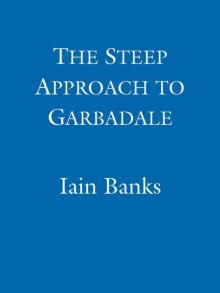 The Steep Approach to Garbadale
The Steep Approach to Garbadale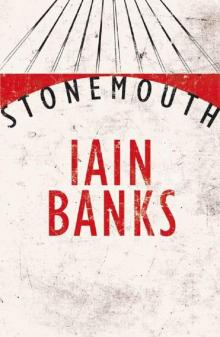 Stonemouth
Stonemouth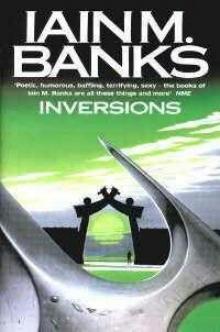 Inversions c-6
Inversions c-6 Raw Spirit: In Search of the Perfect Dram
Raw Spirit: In Search of the Perfect Dram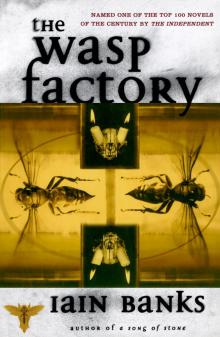 The Wasp Factory
The Wasp Factory Raw Spirit
Raw Spirit Walking on Glass
Walking on Glass Espedair Street
Espedair Street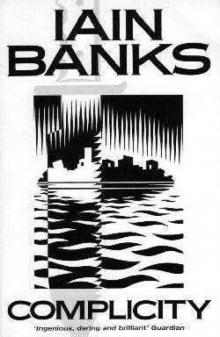 Complicity
Complicity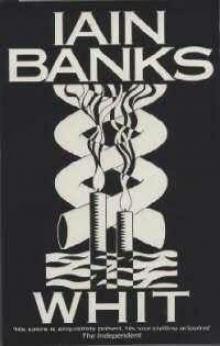 Whit
Whit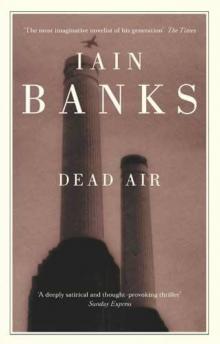 Dead Air
Dead Air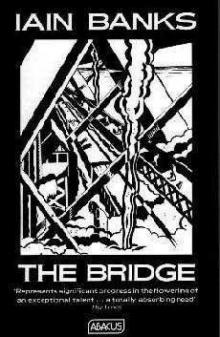 The Bridge
The Bridge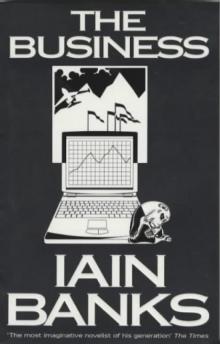 The Business
The Business Canal Dreams
Canal Dreams The Crow Road
The Crow Road